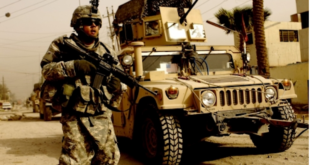 SAMARRA, Iraq (Reuters) – At a checkpoint consisting of a wooden shack wrapped in steel sheets, five young Iraqis with AK-47 rifles have the task of stopping al Qaeda bombers striking the ancient city of Samarra.
SAMARRA, Iraq (Reuters) – At a checkpoint consisting of a wooden shack wrapped in steel sheets, five young Iraqis with AK-47 rifles have the task of stopping al Qaeda bombers striking the ancient city of Samarra.
Bereft of uniforms but for the bright yellow vests they don for visibility, the Sunni Arab neighborhood guards stop and check cars, wave through traffic and scan busy market streets for signs of suspicious movement.
Such guards have been vital in helping cut violence across Iraq, but many say they now fear being abandoned as the Shi’ite-led government prepares to take control of them from the U.S. military in the coming months.
Called Awakening Councils or “Sahwas” in Arabic, the units led by local tribal sheikhs began turning against Sunni Islamist al Qaeda two years ago in western Anbar province.
When they took up arms in Samarra in late 2007, they helped restore order to a city where al Qaeda militants had once ruled the streets, killing everyone from police to trash collectors. Schools closed and streets were deserted.
Militants had earlier destroyed a revered Shi’ite shrine in the northern city in February 2006, plunging Iraq into sectarian chaos.
Now those same streets are bustling and once-shut kiosks sell everything from watermelons to women’s clothes — thanks in part to around 1,200 paid Sahwas in Samarra. Another 1,800 unpaid volunteers operate in the surrounding desert region.
“Without the Sahwa, al Qaeda would still be here and we’d be prisoners in our own homes,” said Omar Idan, who re-opened his small grocery store opposite a checkpoint three months ago.
Baghdad has promised to take 20 percent of what the U.S. military estimates to be 100,000 guards across Iraq into the Iraqi security forces and give others civilian jobs or training.
But the guards, who get paid an average $300 a month by the U.S. military, are troubled about the future even though the government in Baghdad has publicly praised their contribution to improving security and said they would be looked after.
Some government officials eye the unofficial forces, which include many former Sunni Arab insurgents, with suspicion. Some guards fear they may be arrested because of their past.
“We all want jobs in the police, but we can’t be sure,” said Amir Hardan Jadoua, 23, as another fighter waved a truck though their checkpoint. “The government never talks to us, so we’re in the dark about all decisions. We’re getting worried.”
TAKE UP ARMS AGAIN?
Some analysts fear that unless the Sahwas are looked after, they could again take up arms against the government.
The U.S. military will start handing control of the units to the government from October 1, when Baghdad will pay tens of thousands of guards in and around the capital. Others areas are expected to follow after that.
Some 730 of Samarra’s paid fighters will get police jobs. Yet a question mark hangs over the others.
“The government recognizes they did a good job,” said Samarra Mayor Mahmoud Khalaf. “I’m looking for a ministry to take them on. We’re working on it, but we’ll find something.”
The Sahwas are less confident. Many are unhappy with civilian jobs that would not enable them to carry weapons.
“All we hear is the government talking about ending the Awakening councils,” said Abdul Jaleel Mehdi, 23, who monitors a roundabout at an entry point to the city center and who applied for a police job last month, but heard nothing back.
“If they disband us, al Qaeda will come back, find us and kill us all. We won’t last long because they know our faces.”
Lieutenant-Colonel J.P. McGee, U.S. battalion commander for greater Samarra, told Reuters the aim was for a December handover in Samarra.
“I’ve told them we will exercise oversight to make sure that they get paid and this whole process works out okay,” he said. “I’m confident in that the Iraqi leaders told me: ‘We are not going to turn our backs on the (Sahwas)’.”
Iraq’s Awakening leaders hope so too, but they want proof.
“We received an order from the government that all fighters will get jobs, but we don’t fully trust them 100 percent,” said Sunni tribal leader Suhail Latuf, commander of Samarra’s Awakening council.
“We’ll have to see by their actions.”
 Eurasia Press & News
Eurasia Press & News



